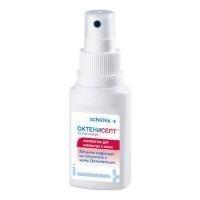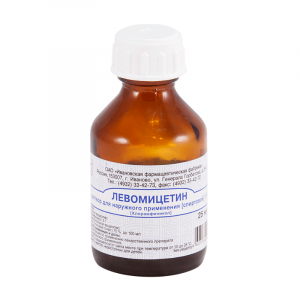Description
Pharmacological action
Pharmacotherapeutic group
Antiseptic and disinfectant.
ATX code: D08AC02
Pharmacological action
Pharmacodynamics
Antiseptic and disinfectant. Depending on the concentration used, it exhibits both bacteriostatic and bactericidal effects. The bacteriological effect of both aqueous and alcoholic working solutions) is manifested in a concentration of 0.01% and less bactericidal – in a concentration of more than 0.01% at a temperature of 22 ° C and exposure for 1 min. Fungicidal action – and at a concentration of 0.05%, at a temperature of 22 ° C and exposure for 10 minutes. Virucidal effect – manifests itself at a concentration of 0.01-1%.
Effective against pathogens of sexually transmitted infections – gardnerelosis, genital herpes of gram-positive and gram-negative bacteria – Treponema spp., Neisseria gonorrhoeae, Trichomonas spp., Chlamidia spp., Ureaplasma spp.
Does not affect acid-resistant forms of bacteria, microbial spores, fungi.
Stable after processing the skin (hands, surgical field) is stored on it in a certain amount sufficient for the manifestation of a bactericidal effect. It remains active (although slightly reduced) in the presence of blood, pus, various secrets and organic substances.
Very rarely causes allergic reactions, irritation of the skin and tissues, does not have a damaging effect on objects made of glass, plastic and metals.
Pharmacokinetics
Practically not absorbed from the digestive tract. After accidental ingestion, 300 mg of Cmax is reached after 30 minutes and amounts to 0, 206 Ñg / L.
It is excreted mainly with feces (90%), less than 1% is excreted by the kidneys.
Indications
As a prophylactic and therapeutic agent for various infections, for antiseptic processing and disinfection.
-0.05%, 0.1%, 0.2% aqueous solutions:
Postoperative care for patients in the ENT and dentistry departments
-0.05% and 0.2% solutions:
Purulent wounds, infected burns, bacterial and fungal diseases of the skin and mucous membranes in dentistry (rinsing and irrigation – gingivitis, stomatitis, aphthae, periodontitis, alveolitis)
Prevention of infections in surgery, urology, obstetrics and gynecology
Prevention of sexually transmitted infections (chlamydia, ureplazmosis, trichomoniasis, gonorrhea, syphilis, genital herpes – use no later than 2 hours after sexual intercourse) disinfection (skin sweating, decontamination (sweat) )
-0.2% solution:
Treatment and sanitation of the genital tract in gynecology during the treatment and diagnostic procedures
Disinfection of dentures.
-0.5% solution:
Treatment of wounds and burn surfaces treatment of infected scuffs and cracks in the skin, open mucous membranes.
Sterilization of a medical instrument at a temperature of 70 ° C.
-1% solution:
Disinfection of thermometers, work surfaces of medical equipment and devices, heat treatment which is undesirable
Treatment of the surgical field and hands of the surgeon before surgery, skin disinfection, treatment of postoperative and burn wounds.
-5% concentrate:
Preparation of aqueous, glycerin and alcohol solutions with concentrations from 0.01 to 1%.
Contraindications
Hypersensitivity to the drug, dermatitis.
Precautions – childhood (up to 18 years)
Special instructions
In patients with open craniocerebral injury, spinal cord injuries, perforation of the tympanic membrane, the drug should be avoided on the surface of the brain, meninges and tympanic cavity.
In case of contact with the mucous membranes of the eye, they should be washed quickly and thoroughly with water.
Concomitant use with iodine is not recommended.
Do not mix chlorhexidine with other disinfectants and detergents. The ingress of hypochlorous whitening substances onto tissues that were previously in contact with chlorhexidine-containing preparations may contribute to the appearance of brown spots on them.
Clothing that was in contact with chlorhexidine should not be exposed to hypochlorites and other active chlorine compounds.
Do not dilute with hard water. Aqueous solutions can be autoclaved at 116 ° C for 30 minutes. Do not sterilize with ionizing radiation.
Composition Active ingredient:
Chlorhexidine bigluconate 20 g
Excipients:
Water up to 100 ml
Dosage and administration
Chlorhexidine is used as a prophylactic and therapeutic agent externally and locally, as well as for disinfection.
0.05%, 0.02% and 0.5% aqueous solutions are used in the form of irrigation, rinsing and application (5-10 ml are applied to the affected surface of the skin or mucous membranes):
A 20% solution is diluted to treat the surgical field 70 % ethyl with an exposure of 1-3 minutes 2-3 times a day (on a swab or by irrigation).
alcohol in a ratio of 1:40. The resulting 0.5% aqueous-alcoholic solution of chlorhexidine is treated with the surgical field 2 times with an interval of 2 minutes.
During postoperative patient care in the ENT and dentistry departments, a solution (0.05% and 0.1%) for rinsing is usually prescribed 2-3 times a day.
Complex treatment of urethritis and urethroprostatitis is carried out by injecting 2-3 ml of a 0.05% solution of chlorhexidine bigluconate into the urethra 1-2 times a day, the course of treatment is 10 days, the procedures are prescribed every other day.
A 0.02% sterile aqueous solution is used for cystoscopy to rinse the bladder.
For the prevention of sexually transmitted diseases of chlorhexidine, bigluconate is effective if it is used no later than 2 hours after sexual intercourse.
Diluted, 0.05% solution, is injected into the urethra for men (2-3 ml), women (1-2 ml) and in the vagina (5-10 ml) for 2-3 minutes. It is also necessary to treat the skin of the inner surfaces of the thighs, pubis, genitals. After the procedure, do not urinate for 2 hours.
For disinfection:
The treatment of the medical instrument and work surfaces is carried out with a clean sponge, moistened with an antiseptic solution, or by soaking. To quickly sterilize instruments, use the same 0.5% solution for 5 minutes.
0.1% aqueous solution of chlorhexidine can also be used to disinfect rooms, sanitary equipment, etc.
Side effects
In rare cases, allergic reactions (skin rash) may occur, dry skin, itching, dermatitis, stickiness of the skin of the hands (within 3-5 minutes), photosensitivity.
Dental discoloration, tartar deposition and taste disturbance with long-term use for oral antiseptics.
Overdose of
In case of accidental ingestion, it is practically not absorbed (gastric lavage should be done using milk, a raw egg, gelatin or a mild soap). If necessary, symptomatic therapy is performed.
Active ingredient
Chlorhexidine
Indications
Vahynaln e infection, Prevention polov h infections
Samara farmfabrika, Russia


